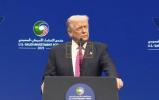אמעריקע האט באשטימט סאודי אראביע אלס הויפט נישט-נאטא אליאירטע לאנד אונטער טראמפ.


President Donald Trump announced a major step forward in U.S.–Saudi relations during the U.S.–Saudi Investment Forum on November 18, 2025, revealing that the Kingdom of Saudi Arabia has been formally designated a major non-NATO ally of the United States. The President described the move as “a BIG DEAL,” highlighting the significant military, strategic, and economic implications attached to the new status.
As part of the expanded security partnership, President Trump confirmed that the United States will sell Saudi Arabia nearly 300 American-made tanks—part of a broader effort to strengthen interoperability and reinforce the Kingdom’s defensive capabilities. Trump emphasized that the equipment represents “some of the greatest military hardware ever built,” underscoring America’s commitment to arming its allies with the most advanced systems available.
Major non-NATO ally (MNNA) status grants Saudi Arabia privileged access to U.S. defense technology, streamlined military sales, joint training opportunities, and enhanced intelligence cooperation. It does not, however, impose NATO-style security obligations on the United States, allowing both nations to deepen collaboration while maintaining strategic flexibility.
The announcement comes as Saudi Arabia increases its investment footprint in the United States, raising its total commitments from $600 billion to a projected $1 trillion. Trump praised the Kingdom’s growing economic engagement, framing the partnership as a mutually beneficial alliance that strengthens American industry while accelerating Saudi modernization goals.
For the administration, the MNNA designation is a clear signal: the United States is committed to a robust and reliable security partnership with Riyadh at a time of rising regional threats. With expanded defense cooperation, massive new investments, and nearly 300 advanced U.S. tanks now moving into production, the Trump Administration has positioned the U.S.–Saudi relationship as a cornerstone of Middle Eastern stability—and a major win for American manufacturing and geopolitical influence.
גאלערי
ווידעאס